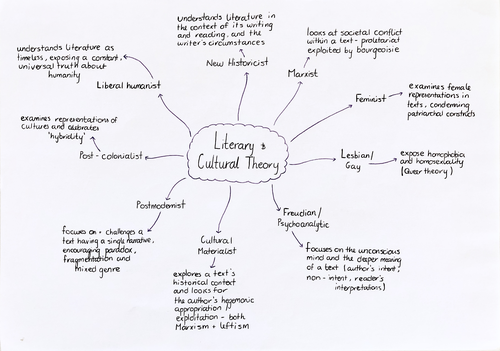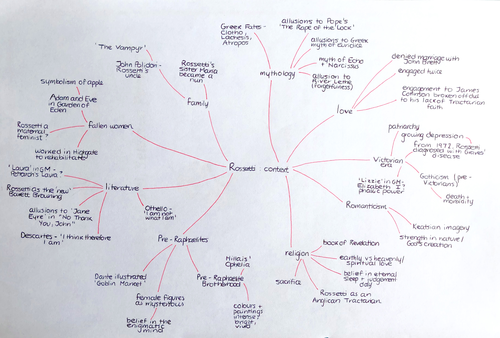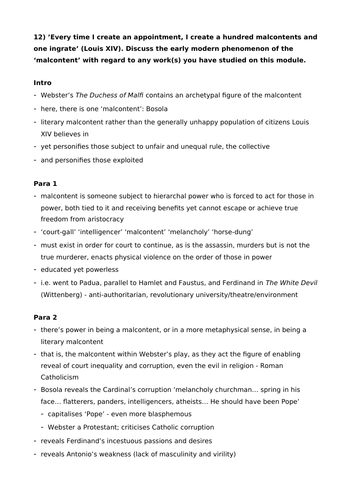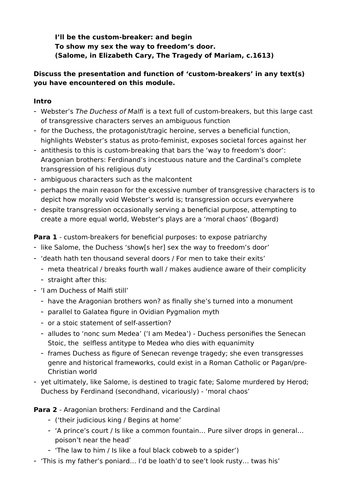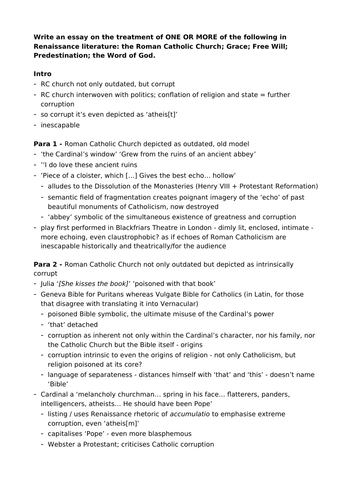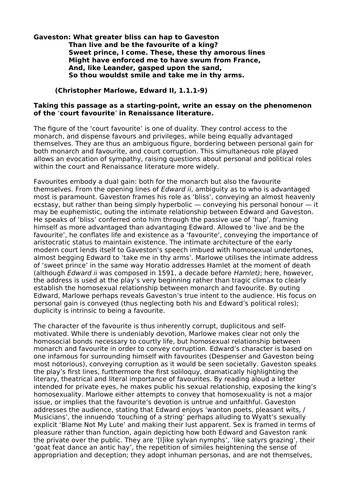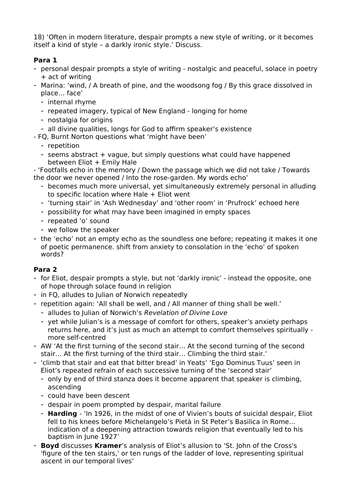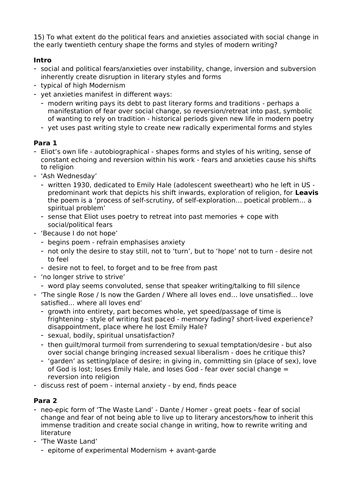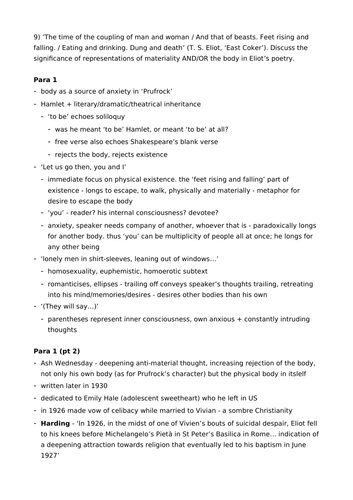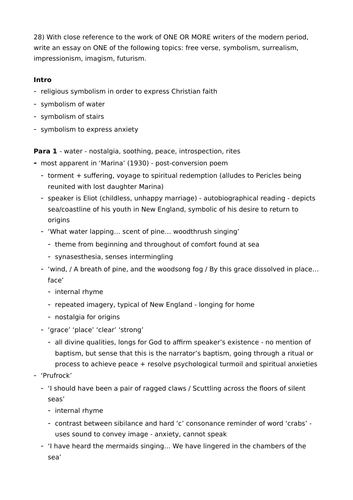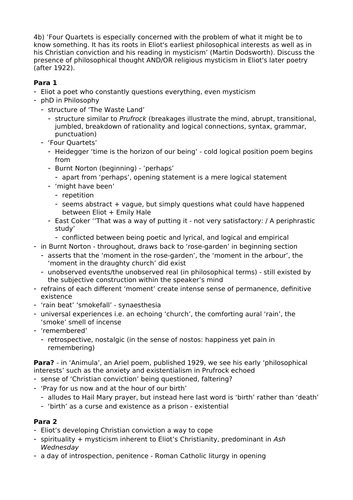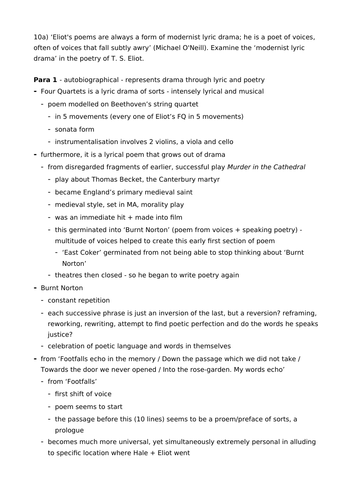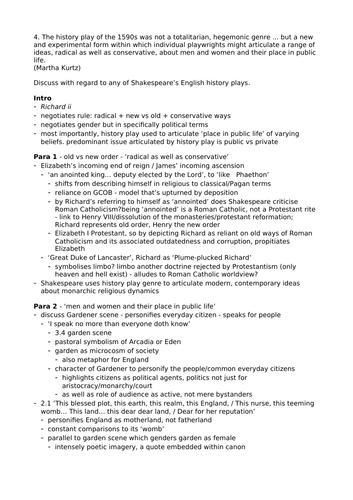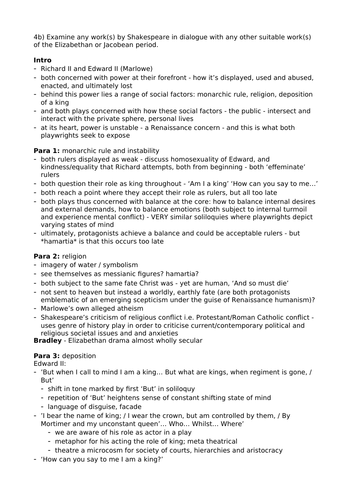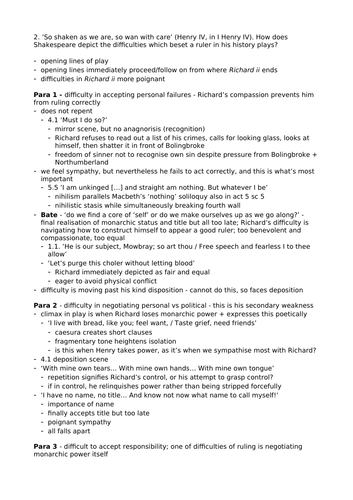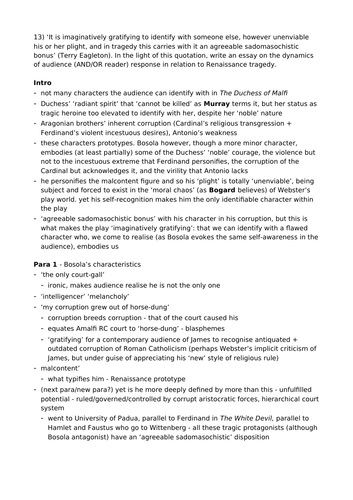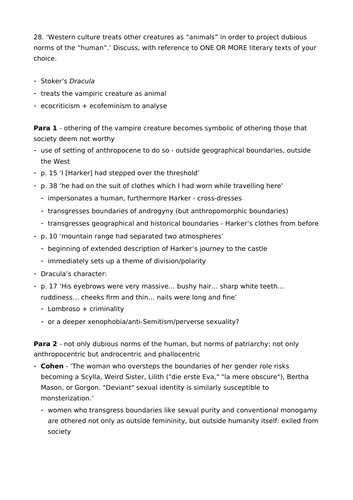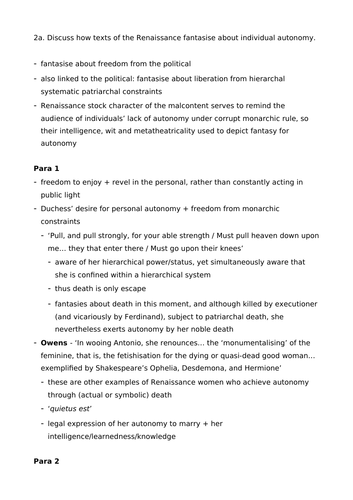
89Uploads
21k+Views
1k+Downloads
English

A-level Literary Criticism Mindmap
A* concise summary mind map of different cultural/literary criticism theories such as postmodernism/new historicism/queer theory etc.
Useful for an easy grasp of new theories other than just Marxism/feminism for A-level English literature (Eduqas/WJEC/AQA/OCR/Edexcel/CIE/CCEA)

Christina Rossetti Context Mindmap
Concise mind map of literary, familial, social context (19th century Victorian era) for A-level English literature Eduqas WJEC. Can also be used for AQA/Edexcel/CIE/OCR/GCSE.

A* Odyssey character list
A* Odyssey character list
A 10-character list of all the characters in Homer’s Odyssey. Includes genealogy, characteristics, transformations, adventures, treatment by authors, and places appeared in literature.
A great quick, easily memorisable overview by an A* student. Perfect for GCSE/A-level/university classics or English literature students.

Oedipus Rex character list
A 10-character list of all the characters in Sophocles’ Oedipus Rex (Oudipus Tyrannus). Includes characteristics, traits, relationships, and notable actions.
A great quick, easily memorisable overview by an A* student. Perfect for GCSE/A-level/university classics or English literature students.

Essay Plan: The Duchess of Malfi & the Malcontent
Essay plan on John Webster’s The Duchess of Malfi which discusses the figure of the malcontent.
It answers the question:
’Every time I create an appointment, I create a hundred malcontents and one ingrate’ (Louis XIV). Discuss the early modern phenomenon of the ‘malcontent’ with regard to any work(s) you have studied on this module.
The plan deals primarily with the character of Bosola. It argues that he plays a role in exposing the corruption of the Amalfi court within the play, using wider historical context of the Jacobean period.
Written by a finalist at Durham University. Excellent resource for A-level and university students.

Essay Plan: The Duchess of Malfi & Transgression
Essay plan on John Webster’s drama The Duchess of Malfi on the theme of transgression.
It answers the question:
I’ll be the custom-breaker: and begin
To show my sex the way to freedom’s door.
(Salome, in Elizabeth Cary, The Tragedy of Mariam, c.1613)
Discuss the presentation and function of ‘custom-breakers’ in any text(s) you have encountered on this module.
This plan looks at characters such as the protagonist, the Duchess, the malcontent, Bosola, and the antagonistic Ferdinand and the Cardinal. Analyses language and key quotes from the play. Looks at incest, immorality, corruption. Includes interpretations from critics.
Written by a finalist at Durham University. Excellent resource for A-level and university students.

Essay Plan: The Duchess of Malfi & Catholicism
Essay plan on John Webster’s drama The Duchess of Malfi on the theme of Catholicism.
It answers the question: Write an essay on the treatment of ONE OR MORE of the following in Renaissance literature: the Roman Catholic Church; Grace; Free Will; Predestination; the Word of God.
This plan looks at the Roman Catholic Church in the context of Jacobean England and its depiction in the play as outdated, corrupt, and inescapable for the play’s characters.
Analyses language: allusions, symbolism, parallelisms, etc.
Looks at wider historical context of various Bibles, Rome, Renaissance rhetoric, the Protestant Reformation, etc.
Written by a finalist at Durham University. Excellent resource for A-level and university students.

Essay: the Court Favourite in Marlowe's 'Edward II'
This essay was written by a second-year undergraduate at Durham University. It answers the question:
Gaveston: What greater bliss can hap to Gaveston
Than live and be the favourite of a king?
Sweet prince, I come. These, these thy amorous lines
Might have enforced me to have swum from France,
And, like Leander, gasped upon the sand,
So thou wouldst smile and take me in thy arms.
(Christopher Marlowe, Edward II, 1.1.1-9)
Taking this passage as a starting-point, write an essay on the phenomenon of the ‘court favourite’ in Renaissance literature.
It looks at the ‘court favourite’ figure in Marlowe’s play, Edward II, as well as other contemporary Renaissance literature, mythology, religion, and homosocial bonds within the early modern court.
Can be used for university and A-level examples.

Essay plan: T.S. Eliot & Despair
This essay was written by a second-year undergraduate at Durham University. It answers the question:
'Often in modern literature, despair prompts a new style of writing, or it becomes itself a kind of style – a darkly ironic style.’ Discuss.
It looks at the influence of despair on T.S. Eliot’s writing style in poems such as ‘Marina’ and ‘Four Quartets’, the role of religion, and introspection in poems such as ‘The Love Song of J. Alfred Prufrock’ and ‘Ash Wednesday’.
Can be used for university and A-level examples.

Essay Plan: T.S. Eliot & Social Change
This essay plan was written by a second-year undergraduate student at Durham University.
It answers the question: ‘To what extent do the political fears and anxieties associated with social change in the early twentieth century shape the forms and styles of modern writing?’
The plan considers T.S. Eliot’s personal life in shaping his writing in poems like ‘Ash Wednesday’. It also considers the poetic form of ‘The Waste Land’ in the context of post world war anxieties and Modernism. It also addresses poems such as ‘Four Quartets’ , ‘Ash Wednesday’, and ‘The Love Song of J. Alfred Prufrock’.

Essay Plan: T.S. Eliot & the Body
This essay plan has been written by a second-year undergraduate at Durham University.
It addresses the question: ’The time of the coupling of man and woman / And that of beasts. Feet rising and falling. / Eating and drinking. Dung and death’ (T. S. Eliot, ‘East Coker’). Discuss the significance of representations of materiality AND/OR the body in Eliot’s poetry.
This looks at the body as a source of anxiety in ‘The Love Song of J. Alfred Prufrock’, his anti-materialism instilled in ‘Ash Wednesday’, spirituality in ‘Four Quartets’, and Eliot’s own personal spiritual beliefs in the context of his poetry.

Essay Plan: T.S. Eliot & Symbolism
This essay plan has been written by a second-year undergraduate at Durham University.
It addresses the question: With close reference to the work of ONE OR MORE writers of the modern period, write an essay on ONE of the following topics: free verse, symbolism, surrealism, impressionism, imagism, futurism.
It looks at the various symbols within his poetry such as water, particularly in ‘Marina’, ‘Prufrock’ and ‘Ash Wednesday’. It also analyses the symbol of the stairs in ‘Ash Wednesday’ and how this affirms his personal Christian faith, as well as introspection and personal exploration in the poem ‘Four Quartets’.

Essay Plan: T.S. Eliot & Mysticism
This essay plan was created by a second-year English Literature undergraduate at Durham University.
It looks at the question: ’Four Quartets is especially concerned with the problem of what it might be to know something. It has its roots in Eliot’s earliest philosophical interests as well as in his Christian conviction and his reading in mysticism’ (Martin Dodsworth). Discuss the presence of philosophical thought AND/OR religious mysticism in Eliot’s later poetry (after 1922).
This analyses Eliot’s own Christian beliefs, the mysticism within his writing, and anxiety within his poems. Poems discussed are ‘Animula’ (from the Ariel collection), Marina, Ash Wednesday, Four Quartets, with mention of The Waste Land and Prufrock.

Essay Plan: T.S. Eliot & Voice
This essay plan was written by a second-year undergraduate at Durham University.
It addresses the question: ‘Eliot’s poems are always a form of modernist lyric drama; he is a poet of voices, often of voices that fall subtly awry’ (Michael O’Neill). Examine the ‘modernist lyric drama’ in the poetry of T. S. Eliot.
The plan analyses the form of ‘Four Quartets’, as well as symbols in ‘Ash Wednesday’ and ‘Prufrock’. Anxious voices in ‘Prufrock’ are further analysed, as is the modernist lyric drama in ‘The Waste Land’ and the role of drama and dramatists in his poetry.

Essay Plan: Richard ii & Radicalism
An essay plan on Shakespeare’s history play, Richard ii, written by a second-year undergraduate at Durham University.
It answers the question:
‘The history play of the 1590s was not a totalitarian, hegemonic genre … but a new and experimental form within which individual playwrights might articulate a range of ideas, radical as well as conservative, about men and women and their place in public life.’ (Martha Kurtz)
Discuss with regard to any of Shakespeare’s English history plays.
The plan discusses the genre of the history play, analysing the language, symbolism and metaphors within Richard ii. The context of Elizabethan/Jacobean England, Protestantism and Roman Catholicism, is embedded into the plan.
Can be used for university or A-level.

Essay Plan: Richard ii & Edward ii
This essay plan compares Shakespeare’s history play, Richard ii, with Edward Marlowe’s play, Edward ii, in the context of Elizabethan/Jacobean England.
It answers the question: Examine any work(s) by Shakespeare in dialogue with any other suitable work(s) of the Elizabethan or Jacobean period.
The plan primarily dissects monarchic power and instability, religion, and deposition, comparing the similarities between both plays.
Written by a second-year undergraduate at Durham University.

Essay Plan: Richard ii & Rulership
This essay plan on Shakespeare’s history play, Richard ii, answers the question: ’So shaken as we are, so wan with care’ (Henry IV, in I Henry IV). How does Shakespeare depict the difficulties which beset a ruler in his history plays?
It deals with the character of Richard ii and his compassion, his difficulty in distinguishing between personal and political boundaries, and the difficulty he faces in accepting monarchic responsibility.
Written by a second-year undergraduate at Durham University.

Essay Plan: The Duchess of Malfi - Identification
Essay plan on John Webster’s The Duchess of Malfi on the theme of audience identification.
It answers the question:
‘It is imaginatively gratifying to identify with someone else, however unenviable his or her plight, and in tragedy this carries with it an agreeable sadomasochistic bonus’ (Terry Eagleton). In the light of this quotation, write an essay on the dynamics of audience (AND/OR reader) response in relation to Renaissance tragedy.
The plan deals primarily with the character of Bosola. It argues that his character’s anti-authoritarian and transgressive characteristics allow the audience to identify with his character.
Written by a finalist at Durham University. Excellent resource for A-level and university students.

Essay Plan: Dracula & Eco-criticism
Essay plan on Bram Stoker’s novel Dracula through an ecocritical and ecofeminist lens.
It answers the question:
‘Western culture treats other creatures as “animals” in order to project dubious norms of the “human”.’ Discuss, with reference to ONE OR MORE literary texts of your choice.
The essay plan discusses the role of the anthropocene in othering the figure of the vampire, as role as gender ambiguity and androgyny. It also discusses the animalisation of Dracula’s character being rooted in anti-Semitism.
Includes critical quotations, analysis of quotations within the novel, and multiple interpretations. Excellent resource for A-level and university students.
Written by a second-year undergraduate at Durham University.

Essay Plan: The Duchess of Malfi & Autonomy
An essay plan on John Webster’s The Duchess of Malfi on the theme of individual autonomy.
It answers the question: Discuss how texts of the Renaissance fantasise about individual autonomy.
The plan discusses freedom in regards to women during the Jacobean era, as well as male autonomy, corruption, patriarchy, power and independence vs oppression, etc. Engages with critical quotations and analyses language within the play.
Excellent resource for university and A-level students. Written by a Durham University second-year student.

